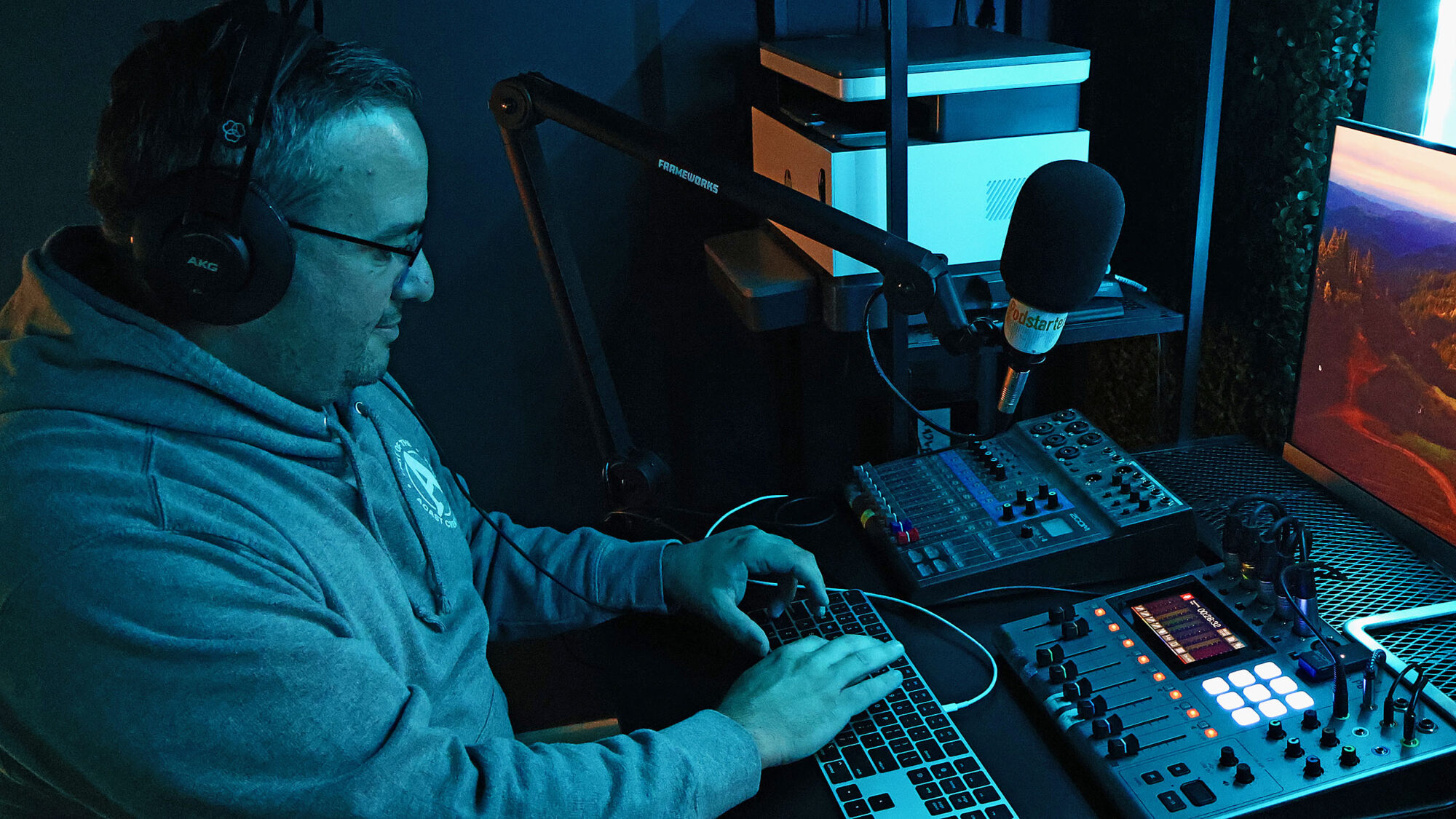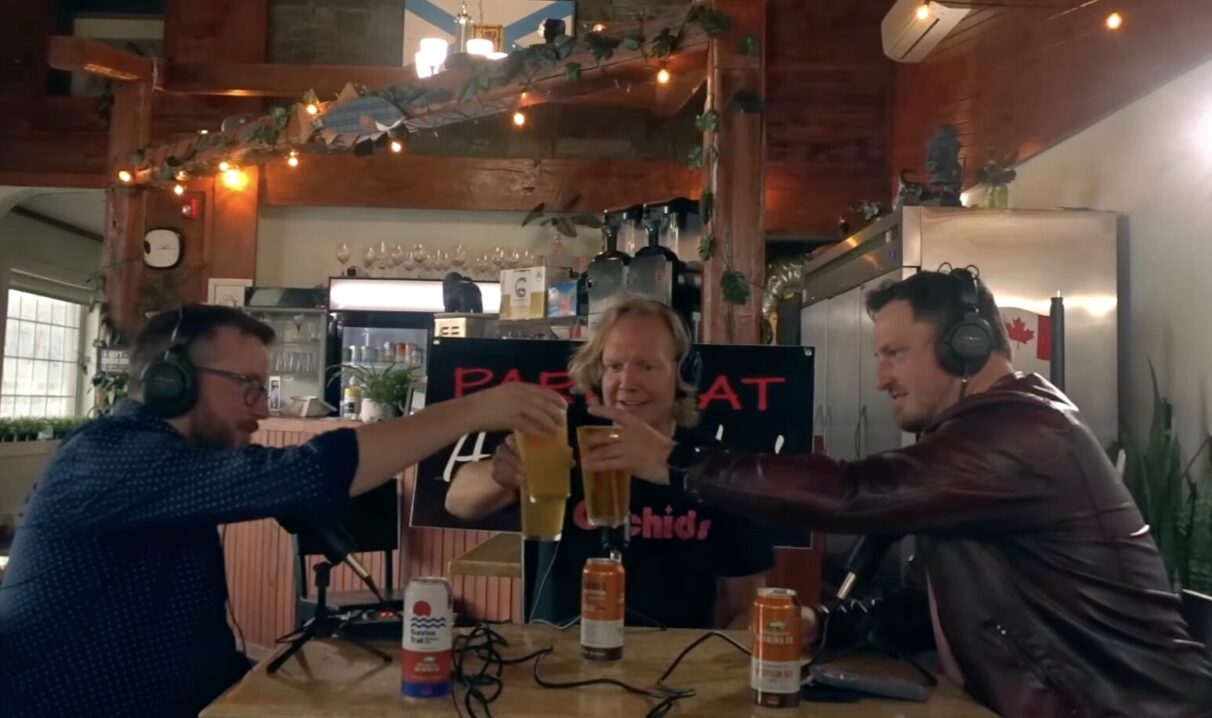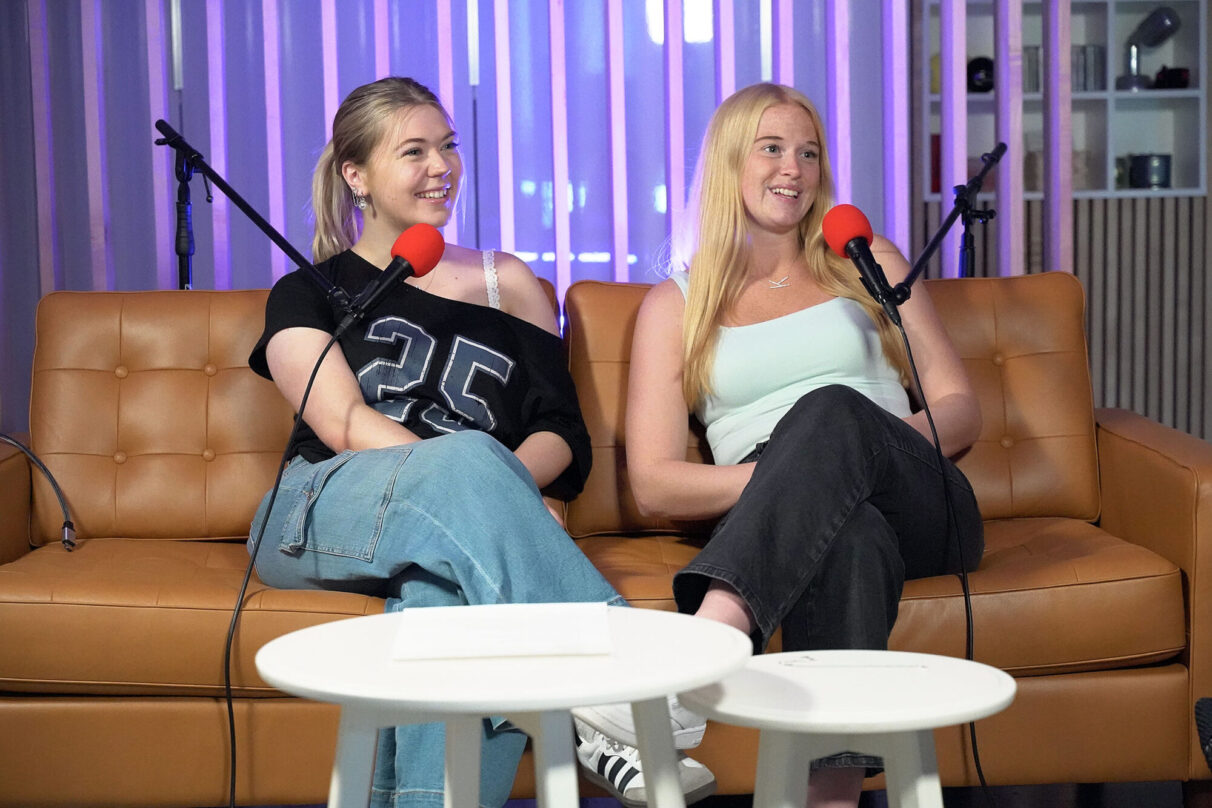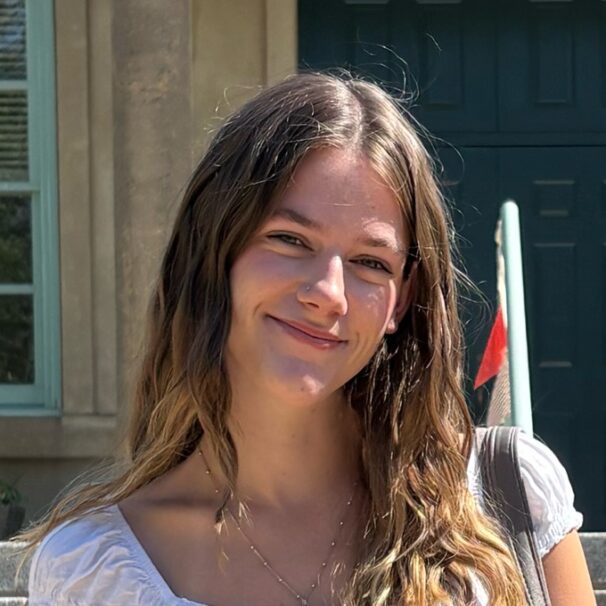Podcasting in Canada: A tough living

caption
Rhys Waters types on his computer at the control panel in the Podstarter audio recording studio in Halifax on Sept. 22, 2025. Podstarter is a local studio in Halifax that produces podcasts for non-profits, businesses and creators.“Cheers!”
Three beer glasses clink together as their drinkers settle in to record a new episode of Afternoon Pint. An hour of conversation passes and just like that, the glasses are empty and another episode is in the books.
Afternoon Pint is a Halifax-based travelling podcast where guests are interviewed over a pint of beer at different local bars. It takes an unorthodox approach to podcasting and doesn’t limit itself to a topic or niche. Instead the co-hosts, Matthew Conrad and Mike Tobin, talk to anyone about anything.
Episodes have been coming out weekly since the summer of 2023 and have covered topics from the arts to paranormal activity to human rights to Canadian politics.
“With everyone fighting today and arguing about things and being online, we bring people together, sit them down at a table and we break the proverbial liquid bread, which is having a pint,” says Conrad.
In 2024, 39 per cent of Canadians listened to podcasts at least monthly, according to Signal Hill Insights. This has grown by 15 percentage points in the past seven years. Yet, with few government supports, high audience targets to hit for advertisers and heavy competition from big networks, it is up to individual podcasters to find creative ways to fund their shows.
For the first three months after launching, Afternoon Pint operated at a loss. The co-hosts spent up to $50 weekly to pay for beers — not to mention the initial costs for equipment and the hours spent editing and preparing for guests. The podcast is a side project and both hosts still work full-time at their day jobs.
But, to alleviate the costs, Conrad applied his skills as a salesman to the podcast. For guests and sponsors alike, he adopted the “just ask” mentality.
“I was in sales, so I often will say I like asking people for money,” Conrad joked.
He asked local businesses to advertise, gaining long-time sponsors Tartan Coffee Company and Kimia Nejat, a Halifax real estate agent.
Now they’re able to finance production costs and even start gaining small amounts of income.

caption
Mike Tobin (left) and Matthew Conrad (right) interview Jonathan Torrens (centre) in Tatamagouche Brewing, a bar in Tatamagouche, N.S. in an Afternoon Pint episode released on YouTube Sept. 2. The co-hosts interviewed Torrens about his roles and experiences in the Canadian entertainment industry.The Canadian landscape
Almost anyone can make a podcast. All it takes is a recording device, a topic and a streaming service like YouTube to upload it to.
But, becoming a financially successful podcaster is a completely different beast for Canadians.
Kattie Laur has been a prominent figure in the Canadian podcasting industry for five years. Based in Brantford, Ont., she writes a weekly newsletter on the podcasting ecosystem called PodTheNorth.
She hosts her own podcast, produces another on the side and works full-time at Bumper, a podcast growth company. Bumper tracks listening data such as downloads, watch time and listener retention, and helps clients launch, market and grow podcasts.
Laur says Canadian podcasting is stuck in a “death cycle.” Podcasters need funding in order to increase production values and attract listeners, but most advertisers and networks require at least 10,000 listeners before they will invest in a show.
“The money is in sponsorships that are hard to achieve and grants that don’t exist,” says Laur.
In terms of government grants, podcasts fall into a grey area between journalism and arts.
Most conversation-based podcasts are not specifically eligible for arts grants that fund Canadian television, movies or entertainment. In addition, when Google decided in 2024 to pay out $100 million to Canadian media outlets in order to be exempt from the Online News Act, no podcast-centred networks were included, according to a list published by the Canadian Journalism Collective.
The Indigenous Screen Office provides one of the only podcast-specific grants in the country. Last year, it spent $300,000 on 12 Indigenous-led podcasts.
“(These grants are) such a great example of what Canada should be doing,” says Laur. “I see what money can do to support independent podcasts and there just isn’t any of that in this ecosystem right now.”
Laur produces a podcast called Curious Tourism: Responsible Travel Podcast, hosted by travel content creator Erin Hynes from Hynes’ home in Toronto.
Hynes uses the word “lonely” to describe the Canadian podcasting industry.
“There’s just not a lot of love for indie shows in Canada, unfortunately,” says Hynes.
Curious Tourism dives into the ethical questions around tourism and paves a path for listeners to learn to travel responsibly. The show hits about 400 downloads per episode, according to Laur.
Hynes says without government grants and support, Canadian creators are left on their own. If they want to stay independent, it’s up to podcasters to find their own advertisers or revenue.
Yet, Hynes says the energy it takes to go back and forth with advertisers isn’t worth the amount of money that a podcaster will eventually receive for the ad. For Curious Tourism, that amount was $200 per episode for a 60-second ad in the middle of the show.
This means creators must rely on podcasting networks that set the same high bar as advertisers in terms of listenership — that golden number of 10,000.
“It’s sort of this paradox where like the networks are there presumably to help our show grow,” says Hynes. “But you need to have grown so much on your own that it’s hard to actually reach the threshold where you can be part of a network and reap those benefits.”
Monetization, authenticity and freedom
Rhys Waters says his podcast Canada is Boring has over 40,000 listeners and yet still isn’t a realistic source of income.
Canada is Boring started as a podcast on Canadian politics in which Waters, who is from the U.K., would regale his Canadian-born co-host with wild stories from the Canadian political world.
Waters has advertisers and an online subscription program through Patreon, a platform that lets creators offer extra content to their audience at a monthly cost. His revenues only cover production costs.
Waters says conversation and creativity, not money, is the point of Canada is Boring.
“Putting this thing out that you’ve created and that is actually having an emotional resonance, it feels like such a privilege to do and I’m like, ‘Oh wow, this is not something to take lightly.’ ”
While he says more funding should be available, he adds the lack of money in Canadian podcasting can make the content more genuine and fosters a bigger sense of community across the country.
“Podcasting allows people to have more time and space to talk about complex things or be familiar, be friendly and be more authentic in that sense.”
Waters created the podcasting network Podstarter in 2020. The goal is to set up companies and non-profits with podcasting producers and editors who can guide the content and add some polish.
Waters spoke with The Signal inside Podstarter’s Halifax recording studio. He gestured to the professional microphones, the soundboard and the pristine, soundproof space, and said the network is what “keeps the lights on.”
According to the 2024 Canadian Podcast Listener study, podcasts continue to reach a younger crowd, with over half of podcast listeners falling between the ages of 18 and 34.

caption
Madison Irvine (left) and Katie Fyfe (right) record the second episode of their podcast, Ring on It? in the Podstarter studio in Halifax in August 2025. The show is sponsored by Charm Diamonds and explores the topics around dating in your 20s. Provided by Madison Irvine.This engagement from younger generations is exactly what prompted the creation of Ring on It?, a Podstarter podcast on relationships, engagements and love sponsored by jewelry company Charm Diamond Centres.
Charm sponsors two podcasts at Podstarter. The first, aimed at a mature audience, shares love stories from across Canada and is currently in its fourth year. The second, Ring on It?, was released last August.
Filmed in the studio, guests sit on a brown leather love seat under rosy lighting. The show hones in on the experience of dating in your 20s and the underlying pressure of marriage.
Madison Irvine, 23, is a co-host and producer on Ring on It?, and works at Podstarter full-time. She says that for Charm, audience reach is the most important part and the ads are “a lot more subtle.”
The hosts wear necklaces from Charm and an ad in the middle of each episode shows them off. There are no discount codes or links, just mentions of the brand name.
“We talk about jewelry a lot in this episode and we want to thank Charm Diamond Centres for giving us this amazing jewelry,” says Irvine in the first episode of the show, gesturing to her necklace with a sparkling letter M.
Irvine says she has a lot of creative freedom from Charm and is able to make the show her own — from guests to topics.
“They do trust me a lot, which is like a luxury not a lot of people can say with their sponsors,” says Irvine.
Since its launch, Ring on It? has hit over 100,000 views across platforms and social media, according to Irvine.
The big players
In Canadian podcasting, the CBC is king.
For the last four years, the CBC has consistently had at least one podcast in the top five downloaded podcasts in Canada. In 2025, it held the top three spots in Triton Digital’s Canadian-made podcast ranking nearly every month and hit over 100 million downloads.
Its daily news podcast, Front Burner, has been in the top spot for three years.
In Triton Digital’s rankings, there isn’t a single independent podcast currently in the top 50.
The CBC gets around 1,250 podcast pitches yearly, according to Arif Noorani, director of CBC Podcasts. Only around one per cent of those pitches are actually produced.
“Podcasting is so competitive,” says Noorani. “The audience will tell you right away if they like what you’re making and if what you made is not of interest to them, it shows up in the numbers.”
From a pitching standpoint, the CBC’s focus lies in narrative storytelling. In the fall 2025 slate, it will be producing seven new podcasts — all in the genre of investigative storytelling.
For example, Dirtbag Climber, the newest edition of CBC’s Uncover series, is a five-part podcast on the unsolved homicide of a rock climber who went by the name Jesse James, and who died in Squamish B.C., reported on by local journalist Steven Chua.
Noorani says the team behind a CBC podcast differs depending on the show, but generally has a blend of independent freelancers and in-house producers and journalists.
In total this year, CBC received about $1.4 billion in government funding and $343 million in advertising across all its divisions, according to its 2024-25 annual report. The amount that the CBC Podcast division receives is not publicly available.
As far as government grants for podcasts, he says “the federal government should look to grow the community” and more provinces should be stepping up to support the independent podcast industry.
“If you look at what’s happening in the states with the clamping down or the shutting down of media… We want to try to support a strong media, a strong ecosystem in Canada,” says Noorani.
In 2022, Hynes and Laur pitched to CBC a number of times with investigative podcast ideas. Hynes said they received no response, and it felt like they were sending a project full of hard work and passion out into the void.
A CBC spokesperson says the public broadcaster has an automated reply to pitch submissions.
In fall 2024 Erin Hynes’ Toronto podcast, Curious Tourism, was picked up by Voyascape, an up-and-coming podcast network that centres around travel shows. Despite not hitting the golden number of 10,000 downloads, Curious Tourism fit the niche and has a loyal audience.
Hynes says it was “very lucky for us that there just happened to be a new network that was willing to take us on.”
The network does the heavy lifting of reaching out to advertisers, pitching and negotiating, which frees up Hynes and Laur to just keep creating. Still, the advertising income from Voyascape barely scratches the surface of the hours spent on the show over the past six years.
“This is not a space to get into if you want to make money (because) you won’t,” says Hynes. “As a Canadian podcaster, sadly it’s just very hard to grow a show to the point that it can be a sustainable form of income.”
About the author

Emma Breton
Emma Breton is a fourth-year Bachelor of Journalism (Honours) student. She enjoys reporting on the arts, public policy and local affairs.
